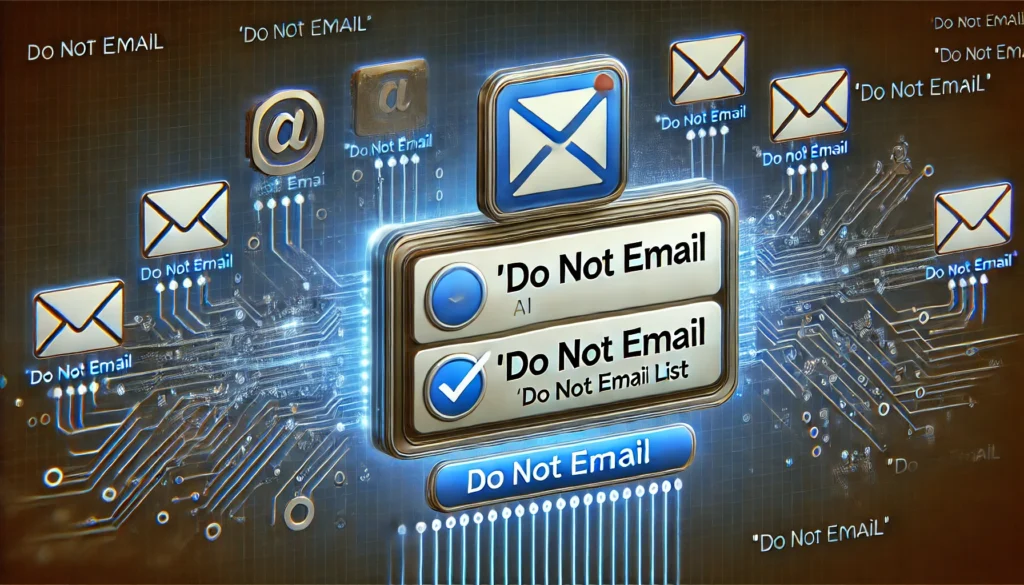At its core, a “Do Not Email” list is a compilation of email addresses that companies must refrain from contacting. These lists are often generated from consumers’ requests to opt out of receiving future emails. The existence of these lists is primarily to protect consumer privacy and ensure compliance with various email marketing regulations.
You may also like: Top Email Deleters for Inbox Management
Historical Context
The concept of managing email preferences has evolved significantly over the years. In the early days of email marketing, there were minimal regulations governing how businesses could interact with consumers via email. The lack of regulation led to widespread unsolicited communication, which eventually triggered public discontent and calls for change.
As digital communication became ubiquitous, so did concerns about privacy and spam. Recognizing the need for regulation, governments around the world began to establish laws aimed at curbing unsolicited emails and protecting consumer data. This led to the development of regulatory frameworks like the CAN-SPAM Act in the United States and the General Data Protection Regulation (GDPR) in the European Union, which mandate the respect of consumer choices regarding email communications.
These legislative measures were not only responses to consumer demands but also reflections of a broader movement towards enhanced digital privacy and security. They set the stage for the modern practices we see today, where consumer rights in digital communication are heavily emphasized.
Current Trends in Email Preferences
Today, most businesses understand the importance of respecting email preferences. The modern consumer is more informed and values their privacy, thus they are more likely to engage with businesses that honor their communication preferences. This shift in consumer behavior has led to a more permission-based marketing approach, where businesses seek explicit consent before sending marketing emails.
The inclusion of easy opt-out mechanisms in every marketing email is now a standard practice, allowing consumers to seamlessly add themselves to a “Do Not Email” list. Companies have embraced transparency, often providing detailed privacy policies and clear instructions on how consumers can manage their email preferences.
Furthermore, there’s a growing trend towards personalization in email marketing, where respecting consumer preferences becomes even more critical. Businesses are now leveraging data analytics to tailor their messages, ensuring that they only target those who have shown interest, thereby optimizing engagement while adhering to privacy standards.
The Role of Consumer Awareness
As consumers become more aware of their rights and the value of their personal data, they are increasingly exercising their choices regarding email communications. This heightened awareness has been fueled by numerous high-profile data breaches and privacy scandals, prompting individuals to be more cautious about whom they share their information with.
Educational campaigns by consumer advocacy groups and regulatory bodies have also played a significant role in increasing consumer awareness. These initiatives help individuals understand their rights under various privacy laws, empowering them to make informed decisions about their email preferences.
As a result, businesses are not only tasked with compliance but also with educating their consumers about their rights and the measures they have in place to protect their data. This educational component has become a vital part of building trust and fostering long-term relationships with consumers.
Legal Framework Surrounding Do Not Email Lists
CAN-SPAM Act
Enacted in 2003, the CAN-SPAM Act established the United States’ first national standards for sending commercial email. The Act requires businesses to include an opt-out mechanism in every email and to honor opt-out requests promptly. Non-compliance can lead to significant fines, making it crucial for businesses to maintain accurate “Do Not Email” lists.
The CAN-SPAM Act also mandates that emails be clearly identified as advertisements, include a valid physical postal address, and refrain from misleading subject lines. These provisions aim to ensure transparency and honesty in commercial email communications.
Furthermore, the Act gives recipients the right to have their email address removed from a company’s marketing database, emphasizing the importance of respecting consumer choices. Businesses must comply with opt-out requests within 10 business days, underscoring the need for efficient email list management systems.

GDPR
The GDPR, implemented in 2018, has set a high bar for data protection and privacy in the European Union. It requires explicit consent from individuals before businesses can send them marketing emails. This consent must be freely given, specific, informed, and unambiguous, ensuring that individuals have full control over their personal data.
Moreover, the GDPR mandates that businesses respect withdrawal of consent, reinforcing the importance of managing “Do Not Email” lists effectively. Companies must also be able to demonstrate how and when consent was obtained, highlighting the need for meticulous record-keeping.
In addition to consent, the GDPR introduces the concept of data minimization, meaning that businesses should only collect and process data that is necessary for their marketing activities. This principle further emphasizes the need for targeted and respectful email marketing practices.
Other International Regulations
Beyond the US and EU, various other countries have enacted their own regulations governing email marketing. Canada’s Anti-Spam Legislation (CASL) and Australia’s Spam Act 2003 are examples of strict email marketing laws that emphasize consumer consent and provide clear guidelines for managing email preferences.
CASL, for instance, requires businesses to obtain express consent before sending commercial electronic messages and mandates clear identification of the sender. It also includes provisions for unsubscribing, similar to those found in the CAN-SPAM Act, and imposes hefty fines for non-compliance.
Australia’s Spam Act 2003 takes a similar approach, prohibiting unsolicited commercial emails and requiring businesses to include an unsubscribe option in every message. The Act also highlights the importance of ensuring that marketing messages are not misleading or deceptive.
In Asia, countries like Japan and Singapore have also introduced regulations to protect consumers from unsolicited emails, reflecting a global trend towards stricter email marketing practices. These international regulations underscore the need for businesses to adopt a global perspective when managing their email marketing strategies.
Practical Implications for Businesses
Email List Management
Effective email list management is crucial for compliance with legal requirements. Businesses should implement robust systems to ensure that “Do Not Email” lists are updated regularly and that they integrate seamlessly with email marketing platforms to prevent unauthorized emails from being sent.
Maintaining accurate records of consumer preferences is essential, as this not only ensures compliance but also enhances targeting and personalization efforts. Businesses must be able to quickly and efficiently process opt-out requests, which requires well-organized databases and clear internal processes.
Regular audits of email lists can help identify any discrepancies or outdated information, allowing businesses to rectify issues before they lead to compliance breaches. This proactive approach is vital for maintaining consumer trust and avoiding potential legal penalties.
Technology and Automation
Leveraging technology and automation can significantly streamline the process of managing “Do Not Email” lists. Automation tools can help synchronize email preferences across all marketing platforms, reducing the risk of human error and ensuring compliance with legal standards.
Advanced email marketing software often includes features such as automatic opt-out processing, real-time list updates, and integration with customer relationship management (CRM) systems. These capabilities enable businesses to maintain up-to-date records and quickly respond to consumer preferences.
Moreover, automation can help businesses track consent and record-keeping obligations, providing a clear audit trail in case of regulatory inquiries. By investing in the right technology, companies can enhance their operational efficiency and focus more on strategic marketing initiatives.

Training and Awareness
Ensuring that all members of a marketing team are aware of the legal implications of “Do Not Email” lists is vital. Regular training sessions can help instill a culture of compliance and customer respect, ultimately leading to more successful and legally compliant marketing efforts.
Training should cover not only the legal requirements but also the practical aspects of managing email lists, such as using marketing software and understanding consumer behavior. Providing employees with the knowledge and tools they need to handle email preferences effectively is crucial for maintaining compliance.
In addition to formal training, fostering an environment where employees feel comfortable discussing compliance issues and seeking guidance is essential. Encouraging open communication can help identify potential problems early and promote a proactive approach to email marketing compliance.
Future Implications and Considerations
Evolving Legal Landscapes
As privacy concerns continue to shape the digital landscape, it’s likely that regulations around email marketing will become even more stringent. Businesses must stay informed about changes in legislation to ensure ongoing compliance.
Emerging technologies, such as artificial intelligence and machine learning, are also influencing the regulatory environment. These technologies offer new ways to collect and process data, but they also raise additional privacy concerns that could lead to new regulatory requirements.
Businesses should engage in continuous monitoring of legislative developments and participate in industry discussions to anticipate changes and adapt their strategies accordingly. Being proactive in understanding and responding to regulatory trends can provide a competitive advantage in the evolving digital landscape.
Consumer Trust and Brand Loyalty
Respecting consumer preferences not only helps businesses avoid legal pitfalls but also builds trust and fosters brand loyalty. Consumers are more likely to engage with brands that prioritize their privacy and communication preferences.
Trust is a key factor in consumer decision-making, and companies that demonstrate a commitment to protecting personal data can differentiate themselves in a crowded marketplace. By prioritizing transparency and ethical practices, businesses can cultivate lasting relationships with their customers.
Moreover, fostering brand loyalty through respectful email marketing practices can lead to increased customer retention and advocacy, ultimately driving business growth. Companies that consistently prioritize consumer preferences are more likely to benefit from positive word-of-mouth and repeat business.
Integrating with Broader Marketing Strategies
The management of “Do Not Email” lists should be a key component of a broader, more holistic marketing strategy. By integrating email preference management with other marketing channels, businesses can create a seamless and personalized customer experience.

Cross-channel marketing strategies that respect consumer preferences across all touchpoints are more effective in engaging audiences and driving conversions. Businesses should aim to create a unified view of customer interactions, allowing for consistent messaging and tailored experiences.
Additionally, integrating email list management with broader customer relationship management efforts can enhance data accuracy and provide valuable insights into consumer behavior. This approach not only ensures compliance but also supports more informed and strategic marketing decisions.
Conclusion
Navigating the legal implications of “Do Not Email” lists is an essential aspect of modern email marketing. By understanding the historical context, current trends, and future implications, businesses can not only comply with legal requirements but also enhance their relationships with consumers. Embracing these practices will ultimately lead to more successful marketing campaigns and a stronger brand reputation.
In conclusion, maintaining a legally compliant “Do Not Email” list is not just a regulatory obligation—it’s a strategic advantage that can enhance consumer trust and drive business success. Companies that prioritize consumer preferences and integrate these considerations into their broader marketing strategies are better positioned to thrive in an increasingly privacy-conscious world.
Further Reading:
Mail goes to the Junk folder by mistake
How To Get Your Name Off Spam Email Lists for Good
Important Note: The information contained in this article is for general informational purposes only, and should not be construed as health or medical advice, nor is it intended to diagnose, prevent, treat, or cure any disease or health condition. Before embarking on any diet, fitness regimen, or program of nutritional supplementation, it is advisable to consult your healthcare professional in order to determine its safety and probable efficacy in terms of your individual state of health.
Regarding Nutritional Supplements Or Other Non-Prescription Health Products: If any nutritional supplements or other non-prescription health products are mentioned in the foregoing article, any claims or statements made about them have not been evaluated by the U.S. Food and Drug Administration, and such nutritional supplements or other health products are not intended to diagnose, treat, cure, or prevent any disease.


